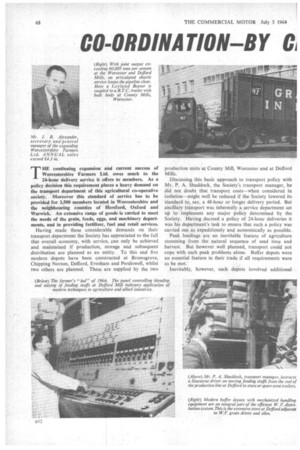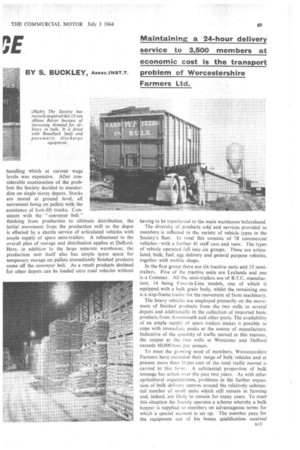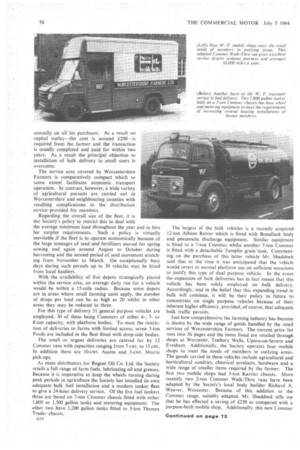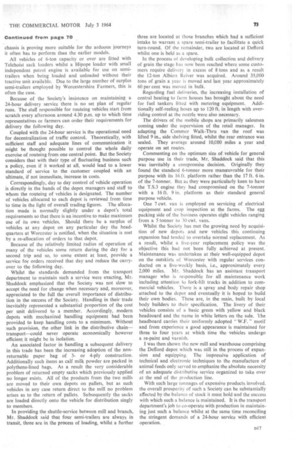CO-ORDINATION-BY C
Page 70

Page 71

Page 72

Page 75

If you've noticed an error in this article please click here to report it so we can fix it.
BY S. BUCKLEY,
Ass oc.I NST.T.
Maintaining a 24-hour delivery service to 3,500 members at economic cost is the transport problem of Worcestershire Farmers Ltd.
THE continuing expansion and current success of Worcestershire Farmers Ltd. owes much to the 24-hour delivery service it offers to members. As a policy decision this requirement places a heavy demand on the transport department of this agricultural co-operative society. Moreover this standard of service has to be provided for 3,500 members located in Worcestershire and the neighbouring counties of Hereford, Oxford and Warwick. An extensive range of goods is carried to meet the needs of the grain, feeds, eggs, and machinery departments, and in providing fertilizer, fuel and retail services.
Having made these considerable demands on their transport department the Society has appreciated to the full that overall economy, with service, can only be achieved and maintained if production, storage and subsequent distribution are planned as an entity. To this end five modern depots have been constructed at Bromsgrove, Chipping Norton, Defford, Evesham and Perdiswell, whilst two others are planned. These are supplied by the two production units at County Mill, Worcester and at Defford Mills.
Discussing this basic approach to transport policy with Mr. P. A. Shaddock, the Society's transport manager, he did not doubt that transport costs—when considered in isolation—might well be reduced if the Society lowered its standard to, say, a 48-hour or longer delivery period. But ancillary transport was inherently a service department set up to implement any major policy determined by the Society. Having decreed a policy of 24-hour deliveries it was his department's task to ensure that such a policy was carried out as expeditiously and economically as possible.
Peak loadings are an inevitable feature of agriculture stemming from the natural sequence of seed time and harvest. But however well planned, transport could not cope with such peak problems alone. Buffer depots were an essential feature in their trade if all requirements were to be met.
Inevitably, however, such depots involved additional handling which at current wage levels was expensive. After considerable examination of the problem the Society decided to standardize on single storey depots. Stocks are stored at ground level, all movement being on pallets with the assistance of fork-lift trucks. Consistent with the "conveyor belt" thinking from production to ultimate distribution, the initial movement from the production mill to the depot is effected by a shuttle service of articulated vehicles with ample supply of spare semi-trailers. A refinement to the overall plan of storage and distribution applies at Defford. Here, in addition to the large separate warehouse, the production unit itself also has ample spare space for temporary storage on pallets immediately finished products come off the conveyor belt. As a result products destined for other depots can be loaded onto road vehicles without having to be transferred to the main warehouse beforehand.
The diversity of products sold and services provided to members is reflected in the variety of vehicle types in the Society's fleet. In total this consists of 78 commercial vehicles—with a further 41 staff cars and vans. The types of vehicle operated fall into six groups. These are articulated, bulk, fuel, egg delivery and general purpose vehicles, together with mobile shops.
In the first group there are six tractive units and 15 semitrailers. Five of the tractive units are Leylands and one is a Commer. All the semi-trailers are of B.T.C. manufacture, 14 being Four-in-Line models, one of which is equipped with a bulk grain body, whilst the remaining one is a step-frame trailer for the movement of farm machinery.
The heavy vehicles are employed primarily on the movement of finished products from the two mills to several depots and additionally in the collection of imported basic products from Avonmouth and other ports. The availability of an ample supply of spare trailers Makes it possible to cope with immediate peaks at the source of manufacture. Indicative of the quantity of traffic Moved in this manner, the output at the two mills at Worcester and Defford exceeds 60,000 tons per annum.
To meet the growing need of members, Worcestershire Farmers have extended their range of bulk vehicles and at present more than ID per cent of the total traffic moved is carried in this form. A substantial proportion of bulk tonnage has arisen over the past two years. As with other agricultural organizations, problems in the further expansion of bulk delivery centres around the relatively substantial number of small units which still remain in farming and, indeed, are likely to remain for many years. To meet this situation the Society operates a scheme whereby a bulk hopper is supplied to members on advantageous terms for which a special account is set up. The •member pays for the equipment out of his bongs qualification received
annually on all his purchases. As a result no capital outlay—the cost is around £200—is required from the farmer and the transaction is usually completed and paid for within two years. As a result the principal objection to installation of bulk delivery to small users is overcome.
The service area covered by Worcestershire Farmers is comparatively compact which to some extent facilitates economic transport operation. In contrast, however, a wide variety of agricultural pursuits are carried out in Worcestershire and neighbouring counties with resulting complications to the distribution service provided for members.
Regarding the overall size of the fleet, it is the Society's policy to restrict this to deal with the average minimum load throughout the year and to hire for surplus requirements. Such a policy is virtually inevitable if the fleet is to operate economically because of the large tonnages of seed and fertilizers moved for spring sowing and again around August to October during harvesting and the second period of seed movement stretching from November to March. On exceptionally busy days during such periods up to 30 vehicles may be hired from local hauliers.
With the availability of five depots strategically placed within the service area, an average daily run for a vehicle would be within a 15-mile radius. Because some depots are in areas where small farming units apply, the number of drops per load can be as high as 20 whilst in other areas they may be reduced to three.
For this type of delivery 51 general purpose vehicles are employed, 30 of these being Commers of either 6-, 7or 8-ton capacity, with platform bodies. To meet the restriction of deliveries to farms with limited access, seven 3-ton Fords are included in the fleet fitted with drop-side bodies.
The small or urgent deliveries are catered for by 12 Commer vans with capacities ranging from 7 cwt. to 15 cwt. In addition there are 10-cwt. Austin and 5-cwt. Morris pick-ups.
As main distributors for Regent Oil Co. Ltd. the Society retails a full range of farm fuels, lubricating oil and greases. Because it is imperative to keep the wheels turning during peak periods in agriculture the Society has installed its own adequate bulk fuel installation and a modern tanker fleet to give a 24-hour delivery service. Of the five fuel tankers three are based on 7-ton Commer chassis fitted with either 1,800 or 1,500 gallon tanks and metering equipment. The other two have 1,200 gallon tanks fitted to 5-ton Thames Trader chassis. The largest of the bulk vehicles is a recently acquired 12-ton Albion Reiver which is fitted with Bonallack body and pneumatic discharge equipment. Similar equipment is fitted to a 7-ton Commer whilst another 7-ton Commer is fitted with a detachable Tamplin grain 'tank. Commenting on the purchase of this latter vehicle Mr. Shaddock said that at the time it was anticipated that the vehicle would revert to normal platform use on sufficient occasions to justify this type of dual purpose vehicle. In the event the expansion of bulk deliveries has in fact meant that this vehicle has been solely employed on bulk delivery. Accordingly, and in the belief that this expanding trend in bulk will continue, it will be their policy in future to concentrate on single purpose vehicles because of their inherent higher efficiency, provided, of course, that adequate bulk traffic persists.
Just how comprehensive the farming industry has become is shown by the wide range of goods handled by the retail services of Worcestershire Farmers. The current price list runs into 56 pages and the items listed are retailed through shops at Worcester, Tenbury Wells, Upton-on-Severn and Evesham. Additionally, the Society operates four mobile shops to meet the needs of members in outlying areas. The goods carried in these vehicles include agricultural and horticultural sundries, chemical products, hardware and a wide range of smaller items required by the farmer. The first two mobile shops had 3-ton Karrier chassis. More recently two 2-ton Commer Walk-Thru vans have been adapted by the Society's local body builder Richard A. Weaver, Worcester. Because of this addition to the Commer range, suitably adapted, Mr. Shaddock tells me that he has effected a saving of £250 as compared with a purpose-built mobile shop. Additionally, this new Commer chassis is proving more suitable for the arduous journeys it often has to perform than the earlier models.
All vehicles of 6-ton capacity or over are fitted with Telehoist sack loaders whilst a Hipope loader with small independent petrol engine is available for use on semitrailers when being loaded and unloaded without their tractive unit available. Due to the large number of surplus semi-trailers employed by Worcestershire Farmers, this is often the case.
Because of the Society's insistence on maintaining a 24-hour delivery service there is no set plan of regular runs. The staff responsible for routeing vehicles start from scratch every afternoon around 4.30 p.m. up to which time representatives or farmers can order their requirements for delivery the following day.
Coupled with the 24-hour service is the operational need for decentralization of traffic control: Theoretically, with sufficient staff and adequate lines of communication it might be thought possible to control the whole daily exercise of routeing from one central point. But the Society considers that with their type of fluctuating business such a policy, even if it worked at all, would lead to a lower standard of service to the customer coupled with an ultimate, if not immediate, increase in costs.
Correspondingly, day to day control of vehicle operation is directly in the hands of the depot managers and staff to whom the routeing of vehicles is designated. The number of vehicles allocated to each depot is reviewed from time to time in the light of overall trading figures. The allocation made is normally slightly under a depot's total requirements so that there is an incentive to make maximum use of its own vehicles. Should there be a surplus of vehicles at any depot on any particular day the headquarters at Worcester is notified, when the situation is met by a re-allocation of orders to that depot.
Because of the relatively limited radius of operation of many of the vehicles some return during the day for a second trip and so, to some extent at least, provide a service for orders received that day and reduce the carryover to the following day.
Whilst the standards demanded from the transport department to maintain such a service were exacting, Mr. Shaddock emphasized that the Society was not slow to accept the need for change when necessary and, moreover, appreciated to the full the overall importance of distribution in the success of the Society. Handling in their• trade inevitably represented a substantial proportion of the cost per unit delivered to a member. Accordingly, modern depots with mechanized handling equipment had been provided to keep handling costs to a minimum. Without such provision, the other link in the distributive chaintransport—could never operate economically however efficient it might be in isolation.
An associated factor in handling a subsequent delivery in this trade has been the increasing adoption of the nonreturnable paper bag of 3or 4-ply construction. Additionally such items as calf milk powder are packed in polythene-lined bags. As a result the very considerable problem of returned empty sacks which previously applied no longer exists. All of the products from the two mills are moved to their own depots on pallets, but as such vehicles in any case return direct to the mill no problem arises as to the return of pallets. Subsequently the sacks are loaded directly onto the vehicle for distribution singly to members.
In providing the shuttle-service between mill and branch, Mr. Shaddock said that four semi-trailers are always in transit, three are in the process of loading, whilst a further three are located at those branches which had a sufficient intake to warrant a spare semi-trailer to facilitate a quick turn-round. Of the remainder, two are located at Defford whilst one is held as a spare.
In the process of developing bulk collection and delivery of grain the stage has now been reached where some customers require delivery in excess of 8 tons and as a result the 12-ton Albion Reiver was acquired. Around 35,000 tons of grain a year is moved and last year approximately 60 per cent was moved in bulk.
Regarding fuel deliveries, the increasing installation of central heating to farm houses has brought about the need for fuel tankers fitted with metering equipment. Additionally self-reeling hoses up to 120 ft. in length with overriding control at the nozzle were also necessary.
The drivers of the mobile shops are primarily salesmen coming under the supervision of the retail manager. In adapting the Commer Walk-Thru van the roof was lifted 9 in., side shelving fitted, whilst the rear entrance was sealed. They average around 10,C00 miles a year and operate on set routes.
Commenting on the optimum size of vehicle for general purpose use in their trade, Mr. Shaddock said that this was inevitably a compromise decision. Originally they found the standard 6-tonner more manceuvrable for their purpose with its 16 ft. platform rather than the 17 ft. 6 in. of the 7-tonner, But as they were particularly keen to have the T.S.3 engine they had compromised on the 7-tonner with a 16 ft. 9 in. platform as their standard general purpose vehicle.
One 7 cwt. van is employed on servicing of electrical equipment and crop inspection at the farms. The egg packing side of the business operates eight vehicles ranging from a 5 tonner to 30 cwt. vans.
Whilst the Society has met the growing need by acquisition of new depots and new vehicles this continuing expansion had tended to overtake normal replacement. As a result, whilst a five-year replacement policy was the objective this had not been fully achieved at present. Maintenance was undertaken at their well-equipped depot on the outskirts of Worcester with regular services conducted on a five-weekly basis, i.e., approximately every 2,000 miles. Mr. Shaddock has an assistant transport manager who is responsible for all maintenance work including attention to fork-lift trucks in . addition to commercial vehicles. There is a spray and body repair shop attached to the depot and eventually it is hoped to build their own bodies. These are, in the main, built by local body builders to their specification. The livery of their vehicles consists of a basic green with yellow and black headboard and the name in white letters on the side. The headboard carries their uniformly adopted " W.F. " motif and from experience a good appearance is maintained for three to four years at which time the vehicles undergo a re-paint and varnish.
I was then shown the new mill and warehouse comprising the Defford depot which was still in the process of expansion and equipping. The impressive application of technical and electronic techniques to the manufacture of animal feeds only served to emphasize the absolute necessity of an adequate distributive service organized to take over at the end of the production line.
With such large tonnages of expensive products involved, the overall prosperity of such a Society can be substantially affected by the balance of stock it must hold and the success with which such a balance is maintained. It is the transport department's job to co-operate with production in maintaining just such a balance whilst at the same time reconciling the stringent demands of a 24-hour service with efficient operation.












































































































































